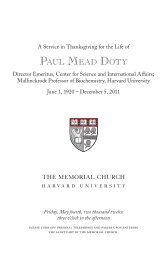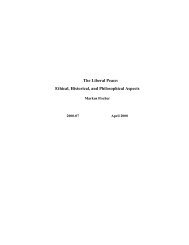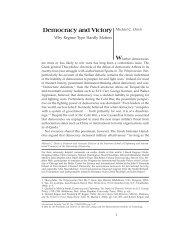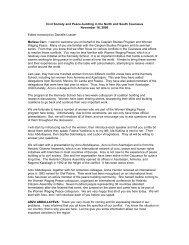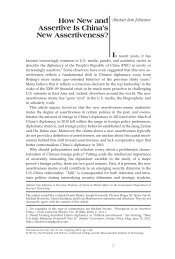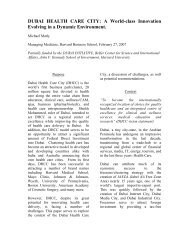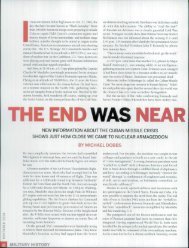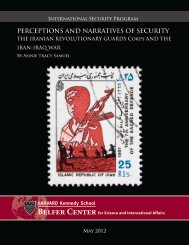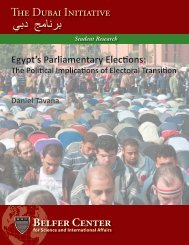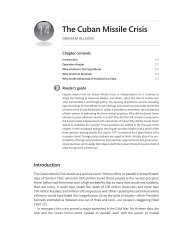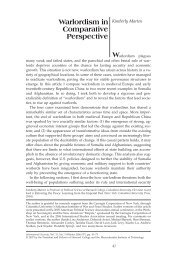The Cuban missile crisis and intelligence performance
The Cuban missile crisis and intelligence performance
The Cuban missile crisis and intelligence performance
Create successful ePaper yourself
Turn your PDF publications into a flip-book with our unique Google optimized e-Paper software.
Downloaded by [Harvard College] at 08:23 18 September 2012<br />
208 INTELLIGENCE AND THE CUBAN MISSILE CRISIS<br />
view, it makes little sense to conclude, as did Dean Rusk, McGeorge Bundy,<br />
<strong>and</strong> John McCone, that US <strong>intelligence</strong> estimates 'took too little account of<br />
the possibility of a dangerous new departure in Soviet policy'. 106 What does<br />
it mean to 'take more account of a possibility'? Would this have materially<br />
affected President Kennedy's use of CIA estimates? We think not. However,<br />
even if the CIA had not changed its estimates, it might have been useful to<br />
try to make more explicit the assumptions on the basis of which they drew<br />
the conclusion that Khrushchev most likely would not deploy nuclear<br />
weapons to Cuba, <strong>and</strong> it might have been helpful to try to identify the<br />
conditions under which Khrushchev might attempt to do so (e.g., if he failed<br />
to underst<strong>and</strong> that a US president would face enormous domestic <strong>and</strong><br />
international pressure not to tolerate such a deployment; if he<br />
underestimated US <strong>intelligence</strong> capabilities; <strong>and</strong> if he were motivated by<br />
fear <strong>and</strong> insecurity, rather than by opportunity). At a minimum this would<br />
have given Kennedy <strong>and</strong> the ExComm a head start on trying to fathom<br />
Khrushchev's mistake after 15 October. 107<br />
But no adjustment to the presentation <strong>and</strong> content of estimates st<strong>and</strong>s<br />
even a remote chance of improving <strong>intelligence</strong> <strong>performance</strong> when political<br />
leaders ignore, manipulate, lead, or censor their <strong>intelligence</strong> services. Both<br />
Amuchastegui <strong>and</strong> Fursenko <strong>and</strong> Naftali provide ample evidence of<br />
pathological <strong>intelligence</strong>-policy relationships caused by meddling or<br />
overconfident leaders. 108 This serves to underscore the importance of<br />
recalling that effective policy requires a certain disposition on the part of<br />
political leaders, as well as a certain competence on the part of professional<br />
<strong>intelligence</strong> analysts. <strong>The</strong> wide variation evident in the three <strong>intelligence</strong>policy<br />
relationships examined in this volume strikes us as utterly typical of<br />
<strong>intelligence</strong>-policy relationships in general. If so, this may be the only sense<br />
in which the <strong>Cuban</strong> <strong>missile</strong> <strong>crisis</strong> was run-of-the-mill.<br />
Certain events may reflect the significant dimensions of all your life,<br />
mirroring your entire history in a passing moment. Have you ever had<br />
an experience like that? Have you been caught by an event that<br />
suddenly pulled the curtains back?<br />
- Michael Murphy, Golf in the Kingdom



